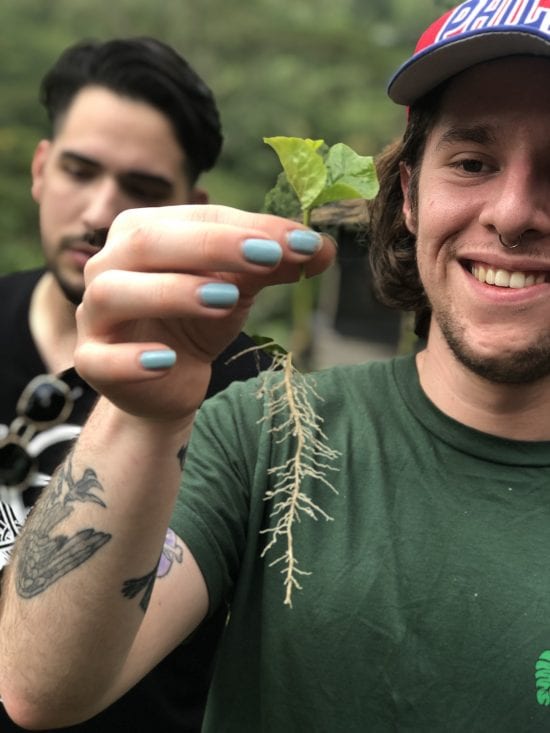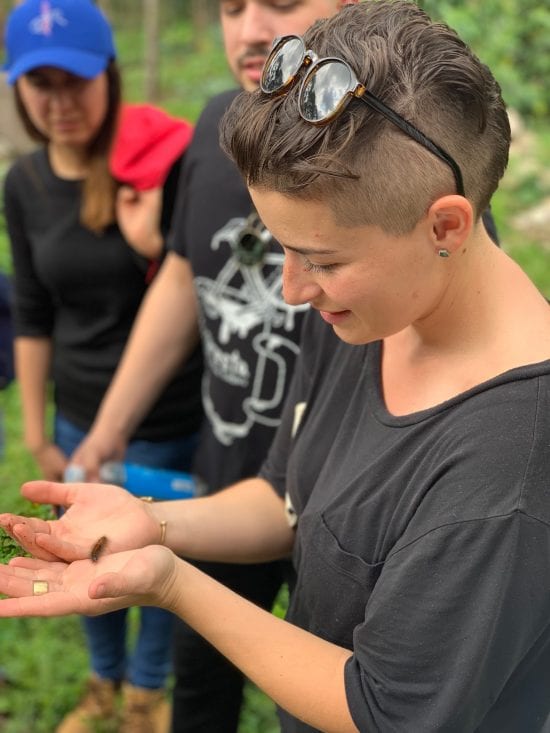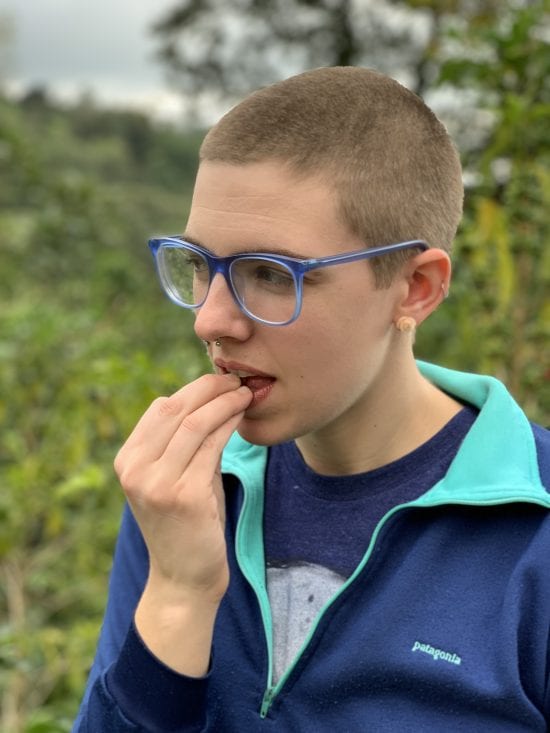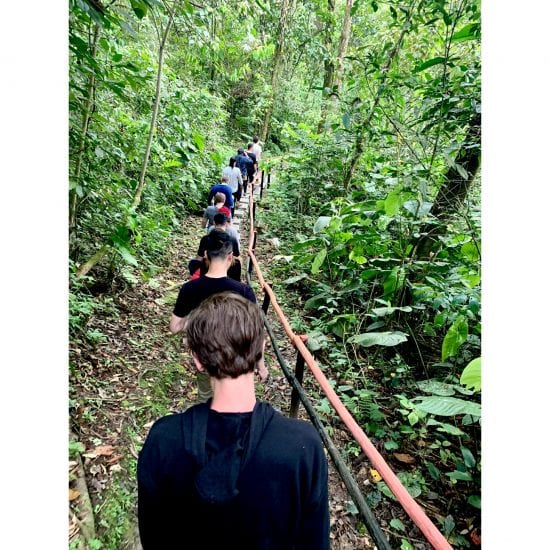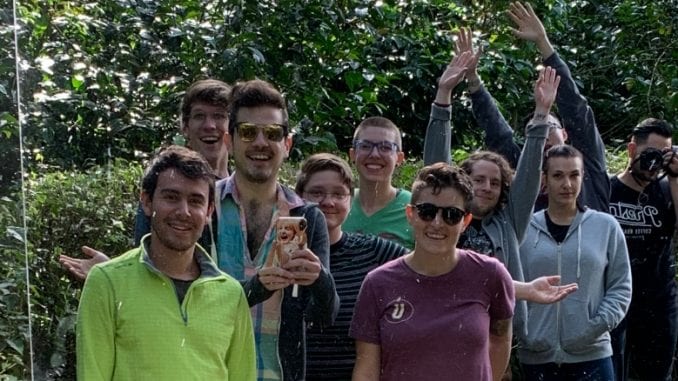
After weeks of training and competing at this year’s qualifying competitions, the Glitter Cat trainees visit La Palma y El Tucan in Colombia.
BY KENDRA SLEDZINSKI
SPECIAL TO BARISTA MAGAZINE
Photos courtesy of Kendra Sledzinski
“This might be my favorite place to eat in the world,” stated Glitter Cat founder T. Ben Fischer as our van pulled over for pan de maiz in Zipácon, Colombia. I was in the backseat with NYC coffee professional Eric Grimm, and we were on our way to La Palma y El Tucán with seven Glitter Cat trainees for a coffee-education opportunity of a lifetime. Filled with fresh cheese, the group was universally calibrated on the hot, pillowy cornbread: excellent plus.
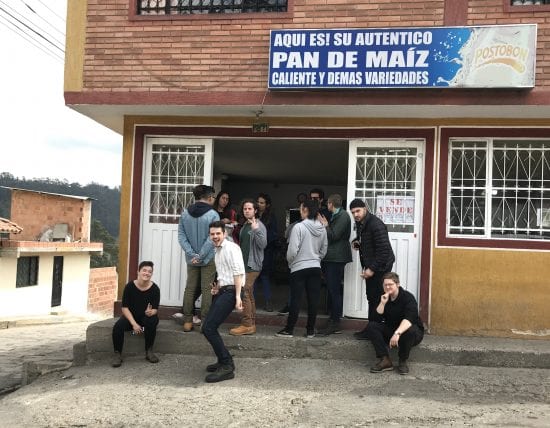
With the U.S. CoffeeChamps qualifying competitions behind them, Becca DeBoer, Kara Huckabone, Elisabeth Johnson, Emily Orendorff, Topher Ou, David Palazuelos, and Rodrigo Vargas were reunited. They met last October at the inaugural Glitter Cat Barista Bootcamp, a training program focused on providing coaching to members of marginalized communities to increase representation and diversity on the national and international competition stage.
The journey to La Palma started at the dry mill, where we learned about color, size, and density sorting, and were left sprinkled with the dry mill’s version of glitter: coffee husk dust. Sights from the two-hour ride from Bogotá included Colombian farms covered in dense but fleeting fog and rolling green hillsides that were dotted with sheep and plenty of cows.
Upon arriving, we were led all through the farm, which is sectioned by variety. We made our way through Sidra, Gesha, and Java trees, stopping to taste a few ripe coffee cherries along the way. T. Ben Fischer remembers the first time he tasted coffee cherries. “The producer was freely giving them to me and I could not help but think, you could be selling these!” he remarked. “When I brought this up to her, she said that our education and excitement is worth more than the price for those dozen cherries. Coffee is about building an international community, and these relationships can be built in so many ways. I’ll never forget her sacrificing those cherries so I could experience her coffee in a new and exciting way.”
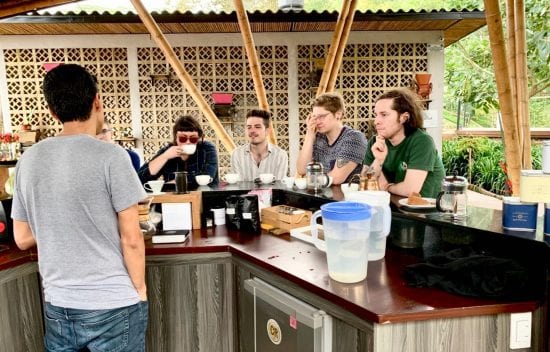
We listened with curiosity regarding anaerobic and lactic fermentation at the wet mill and learned about the challenges of drying in such a moist climate.
We spent the rest of the day tasting coffee and enjoying the last bits of sunshine on La Palma’s deck, the center of which features an espresso bar. Dinner was ajiaco, a typical Colombian soup with native potatoes. We retreated to our cabins nestled among the coffee trees for sleep.
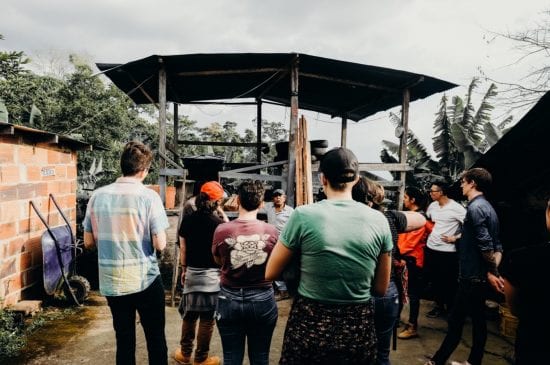
The next day, we went down across the Apulo River and up through Gesha trees to the cupping lab, a sight itself with exterior mirrors that create an illusion of continued flora and fauna.
Rodrigo Vargas was particularly struck by a natural Typica on the table. “The pineapple and coconut creaminess in that coffee reminded me of a piña colada. I fell in love with it instantly. I still have dreams about it, and not being able to have it haunts me,” he said. Rodrigo is no stranger to coffee at origin—he was born in Peru and started his coffee career in Puerto Rico.
“One thing resonates through all of them: There is a degree of uncertainty with the future of the industry at origin. Being they economical adversities, lack of people to work in the fields, or climate change, these issues resonate in the countries I’ve been to and make me wonder what can we do as an industry to change this,” Rodrigo said. He finds La Palma’s Neighbors & Crops program inspiring and a step toward this type of change.
The visits to producers who are part of the Neighbors & Crops programs presented additional education and left a lasting impression.
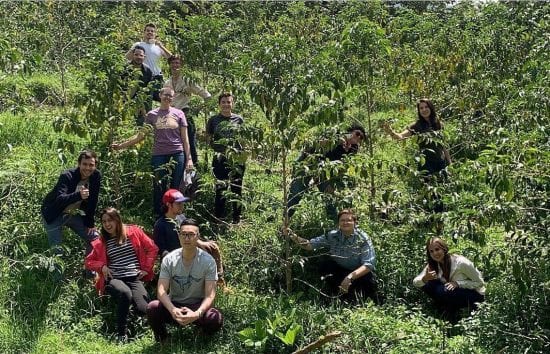
“I think most people pre-origin trip have an idea of straight and flat fields of coffee trees that you zigzag through picking cherries. When we arrived at Don Efraín’s farm and almost immediately started whacking our way through all sorts of huge trees and plants and seeing tons of coffee trees and other crops all around us, I felt like I was in Honey I Shrunk the Kids,” recalled Eric Grimm. “It was such a thrill! The next day, we attended a presentation on the importance of biodiversity, and getting to learn how all the surrounding crops and trees contribute to the growth of coffee made that unexpected adventure all the more special.”
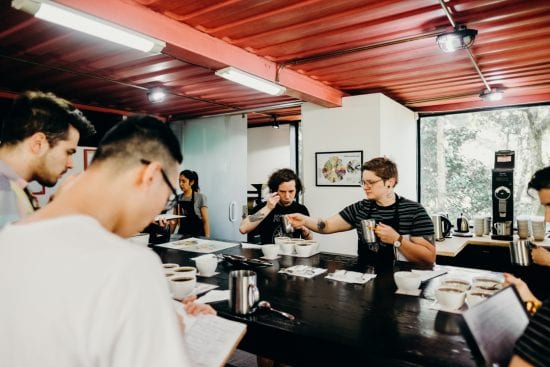
Kara Huckabone was humbled by the experience of spending time with producers on their beautiful and lush land. “Efraín’s one question for us was, ‘Why are the C-market prices so low?’ I felt incredibly saddened by my helplessness in response to that question. We, as baristas, are coffee professionals and therefore can make a positive change. I am motivated to somehow work for change. We are not helpless.”
It was a question that rendered all 11 of us speechless.
“I never could have fully understood both the positive impact of working in an industry with a worldwide community and supply chain and the very real threats to our industry if I hadn’t witnessed it firsthand,” said Eric. “It was the greatest educational opportunity I’ve ever had, and being face-to-face with a farmer who asked if we could provide any insight as to why the C price was so low meant that we couldn’t hide from it and would have to confront it when we returned to our jobs.”
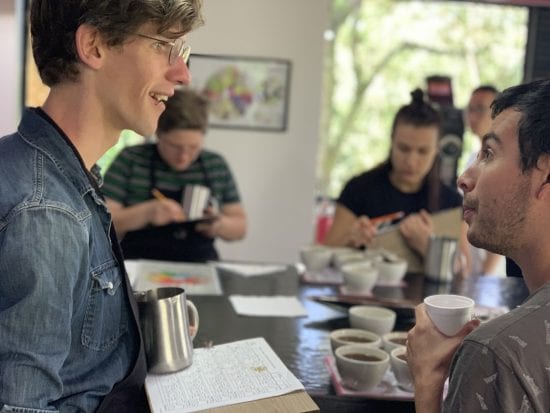
Perhaps it was the sweet granadilla fruit, the fragrance of the coffee blossoms, or the exciting game of tejo, but spirits were certainly elevated the entire week.
“Polishing wares, editing scripts, managing each others anxieties, and holding hands anxiously awaiting announcements forms some pretty special bonds,” said T. Ben Fischer. “To now share this experience was like electricity, powerful, energizing, and I could not help but smile looking around the group.”
Can we get a head judge to sign off on an extraordinary?
————————————————-
Glitter Cat trainees who weren’t able to be in Colombia with the group but were greatly missed: Joseph William Gonzalez, Audrey Delmar Propster, and Anthony Ragler. Anthony Ragler, who placed 10th in Nashville, would be advancing to Kansas City with Emily Orendorff (third, Denver), Rodrigo Vargas (fifth, Nashville) and Elisabeth Johnson, who qualified not only in Barista, but also in Cup Tasters.
Kendra Sledzinski works as a trainer and educator coach for Joe Coffee Company in Philadelphia and New York City. Filter coffee is her drink of choice, and she can’t wait to slurp many as a Brewers Cup judge in Kansas City, Mo., between cheering on her Glitter Cat friends. She loves ’90s music karaoke, supports the houseplant and cacti trend, and is patiently waiting for pretzels to be the next big thing.

